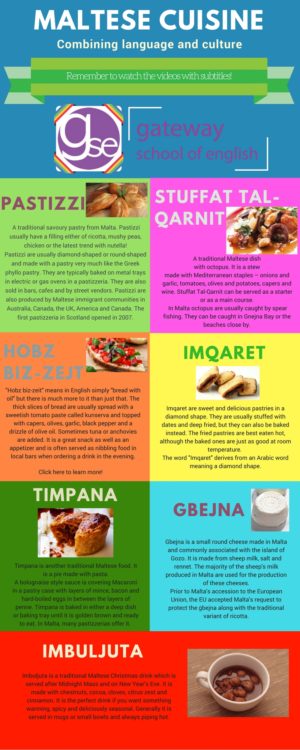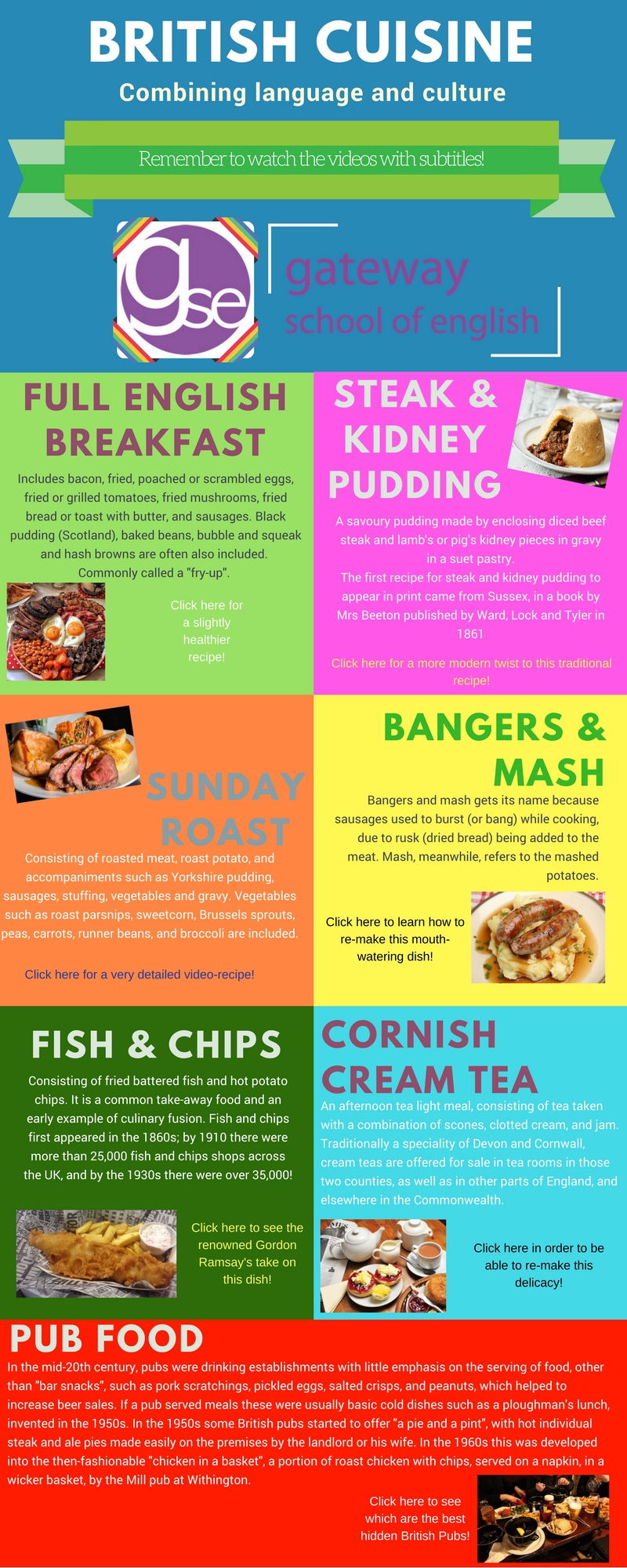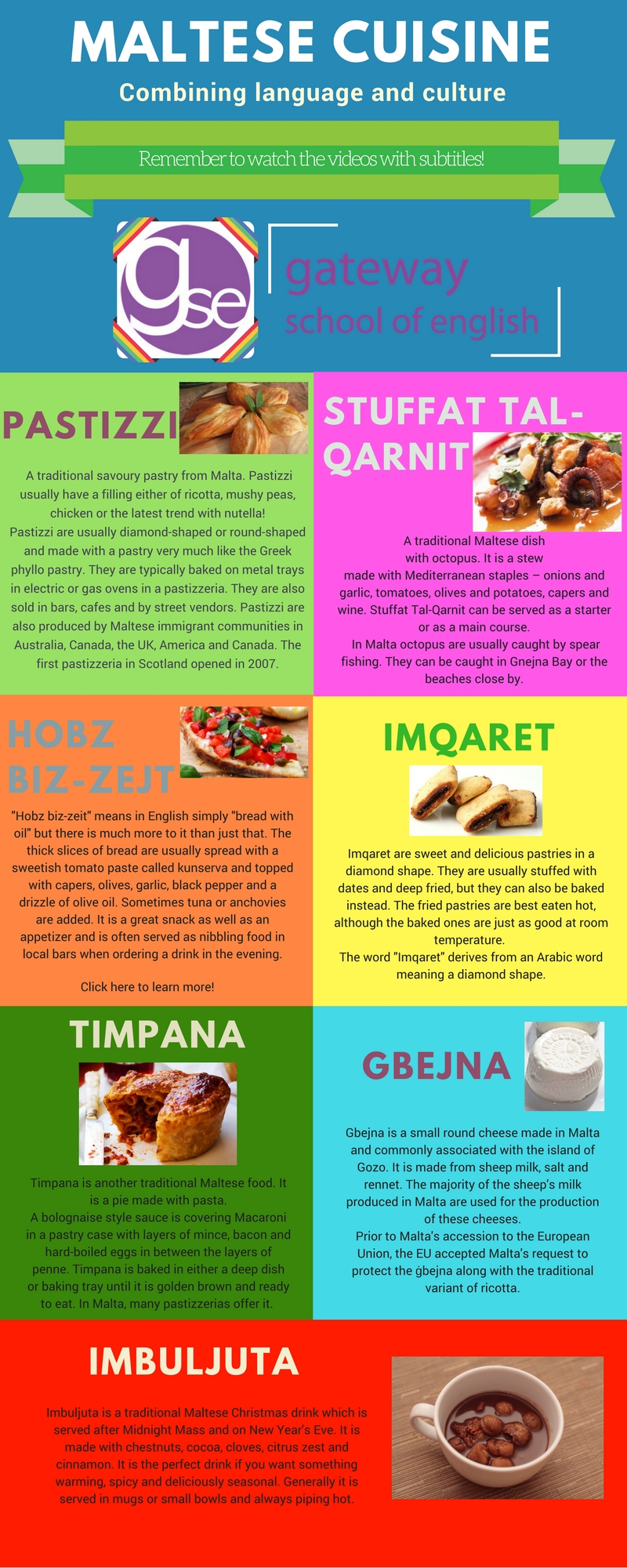Food, glorious food! British vs. Maltese Cuisine

Please refer to the glossary at the end of the article for any difficult words or phrases.
Combining language and culture
A country’s cuisine reflects its history as much as its language. As words are derived from foreign phrases that were used by foreign inhabitants of the country through the years, over long stretches of time, the local culture evolves and affects various aspects of the people’s language, their social norms, and the way they eat, i.e. their food.
It is therefore interesting for students of any language to take a holistic approach to the language they are learning by seeing it as part of a wider culture.
One interesting example is the dish of ‘Bangers & Mash’ pictured in the infographic below, which is a result of the past German influence on British culture.
Similarly, according to English professor and writer Panikos Panayi, the British favourite ‘Fish ‘n’ Chips’ is also said to have historically foreign origins, with the fried fish being attributed to Jewish gastronomy and the potato chips to France (hence the American term ‘French fries’). The dish officially came to signify national identity in around 1930.
Moreover, French cuisine continued to have a strong influence on English cooking throughout the 19th century, with French celebrity chefs such as the Roux brothers and Raymond Blanc still contributing to the formation of English cuisine today.
How can this help you learn English?
Becoming familiar with Britain’s traditional food and national dishes can make it both easier and more interesting to understand the context of certain everyday language, whether you hear this on TV, the radio, in films or in conversations with/between native speakers.
It would also be especially fun to try such dishes for yourself, either in a genuine restaurant or by experimenting with some authentic recipes in your own kitchen! On top of this, following a recipe can be a great language exercise as you would be engaging with the specific language of cooking, as seen in this typical sentence taken from a traditional ‘Steak and Kidney Pie’ recipe (linked here https://www.bbcgoodfood.com/recipes/1313/a-good-steak-and-kidney-pie):
“Shake off any excess flour (reserving it) then fry the beef in batches until golden-brown. As each batch is done, transfer it to the casserole.”
Verbs underlined, nouns in bold
Below is a table with a handful of common nouns and verbs used in cooking:
Nouns for ingredients and utensils |
Verbs for instructions |
| Common ingredients | · cut |
| · flour | · chop |
| · milk | · dice |
| · pastry dough | · roll |
| · sausages | · stir |
| · mashed potato | · peel |
| · carrots | · heat |
| · mincemeat | · let (something) simmer |
| · steam | |
| Common everyday utensils and appliances | · fry |
| · ladle | · warm up |
| · mixing bowl | · boil over |
| · saucepan | · shake off |
| · chopping board | |
| · breadknife | |
| · pots and pans | |
| · vegetable steamer |
Reading a recipe can be good for committing new language to memory as it is easier to remember words once you have seen them written down, however a different sort of challenge would be to follow a recipe audio-visually, by watching and listening to someone explain the recipe as they do it themselves, step-by-step. Subtitles can be a great help too!
What about traditional Maltese cuisine?
Like British cuisine, Maltese food is a fusion of various cultural influences that shaped Maltese history over time, including Mediterranean (most noticeably Sicilian), English and Arabian cuisines.
Traditional Maltese food can be described as seasonal and rustic, as the availability of different dishes depends on what local produce is in season, in order for it to be fresh.
Although some restaurants offer a mix of specialities, there are plenty of eateries that specialise in certain local foods, many of them in the town of Mgarr in the northwest part of Malta, right next to the parish church. The traditional stewed rabbit (fenek), widow’s soup (soppa tal-armla), lampuki pie (with dorado fish) and bigilla (a paste made of chickpeas taken as a dip with savoury crackers known as galletti), are amongst the most popular and palatable Maltese dishes.
And of course, Malta would be nothing without its famous pastizzi, which are a savoury (and oily) pastry snack filled with local ricotta (hence called ‘cheesecakes’) or peas. This too has evolved to include an option with Nutella chocolate for the more adventurous. Whatever you decide to have for lunch, dinner, a snack or dessert, do not forget to wash it down with a bottle or can of ‘Kinnie’ – the local bittersweet soft drink of choice.
Hungry yet? Go ahead and feast your eyes on the dishes pictured below and click on the names to enjoy a video demonstration of each recipe, or click here to watch a 3-minute documentary on Maltese food.
We hope that you will try some of them out to truly savour and understand the distinct flavours of Malta. Enjoy, or, as we say in Malta, “L-ikla t-tajba!”
Now tell us, which of the above British and Maltese dishes have you tasted so far and which will you be trying next?
Glossary:
- derived – originating from
- stretches of time – periods of time
- norms – standards of behaviour that are accepted in a particular society
- holistic – thinking about the whole of something, and not just dealing with particular aspects
- attributed to – believed to be resulting from (something)
- contributing to – influencing, taking part in (something)
- signify – represent, symbolise
- formation – development, evolution, process of becoming
- context – background situation of something
- genuine – real, authentic
- experimenting – trying out a new idea, method or activity
- authentic – real, traditional, original
- engaging – interacting, using, playing around with
- batches – amounts or quantities of food
- casserole – a deep dish, sometimes with a lid, used for cooking a mixture of meat, vegetables etc. in an oven
- handful – a small quantity/number/amount of something
- mincemeat – a sweet food made by mixing small pieces of dried fruit and spices, used especially to make mince pies; sometimes used instead of ‘minced meat’ (which is literally ground meat, most commonly beef)
- ladle – a large deep spoon with a long handle, used for serving liquid food such as soup
- simmer – to cook slowly at a temperature near boiling, or to cook something in this way
- committing something to memory – to study something carefully so that you can remember it exactly
- fusion – combination
- noticeably – significantly, in particular
- seasonal – available only during a particular time of year
- rustic – typical of the simple style of the countryside
- produce – food that has been farmed
- specialities – a food or drink that a person, a restaurant, or a region is well known for and that you cannot always get in other places
- eateries – restaurants, bistros
- savoury – salty or spicy and not sweet OR pleasant to taste or smell
- palatable – tasty, flavoursome
- wash (food) down with (drink) – drink after eating
- bittersweet – tasting bitter and sweet at the same time
- of choice – something one chooses
- savour – enjoy a flavour or experience
- distinct – particular, identifiable
- flavours – particular tastes of different food or drink
Words/phrases are listed in the order in which they appear in the text and most definitions are taken from the Macmillan Dictionary, available online at: http://www.macmillandictionary.com/
14 of these words are in the word search below. Can you find them? Hint: they are all related to food and cooking!
Y D L A N O S A E S L P F A B
B I T T E R S W E E T Y X W H
O Y Q V L E E A T E R I E S S
B R O T D E L O R E S S A C A
M I N C E M E A T E L D A L V
F C A U T H E N T I C K K A O
S I M M E R E C U D O R P E U
B H G E L B A T A L A P V C R
E U B X S R U O V A L F V O Y
O S E I T I L A I C E P S H M

